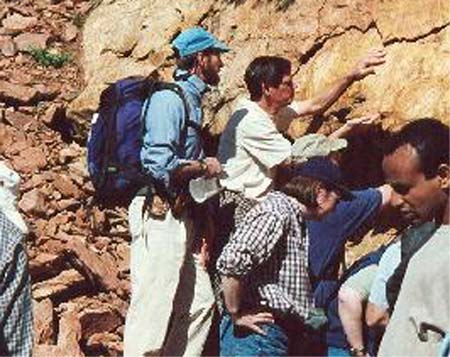
Involvement as a Geology Profesor in Ghana Geology and Development by RPCV David Norman
INVOLVEMENT AS A GEOLOGY PROFESSOR IN GHANA GEOLOGY AND DEVELOPMENT
NORMAN, David I., Earth and Environmental Science, New Mexico Institute Mining & Technology, 801 Leroy Pl, Socorro, NM 87801-4796, dnorman@nmt.edu.
I served in Ghana from 1966-1969 (Ghana V) as a Peace Corps physics-math teacher, then received a PhD in geology in 1976. My involvement in African geology started in 1985 with a Cameroon Ph.D. student, Francois Nuguene, who mapped a giant tin deposit. Dr. Henry Appiah with the then UST School of Mines, Tarkwa, Ghana toured mining schools in 1987. We met and started a long-term association that includes Fulbright grants to both of us and several funded research grants. Some significant accomplishments are developing an improved gold sluice copied in part by artesian miners, a training film on how to separate gold without the use of mercury, finding locally high levels of arsenic and nitrate in rural Ghana drinking waters, developing a simple method of using laterite to remove arsenic and Fe from drinking waters, and finding the diamond source rocks at Akwatia. Other involvement in Ghana geology includes 3 New Mexico Tech students that did their MS research in Ghana; advising 2 MS and 2 PhD Ghanaian students that performed field work in Ghana; leading a New Mexico Tech SEG student field trip to Ghana, and am planning a second trip; leading a group of 15, K-12 teachers to Ghana that worked on rural water quality; introducing several mining companies and consultants to Ghana; and helping plan helping several Ghana ecotourism trips. Continuing projects are in rural water quality, tailings dam containment, and a low cost, Ghana-made, solar water heater. Funding for cooperative geological projects include NSF, USAID-PSTC, the Fulbright Foundation, US Dept. of Forestry, and the Hilton Foundation. The problem with funded African cooperative research is the long time commitment for the PI with generally no salary support and low rate of progress because of the same factors Peace Corps volunteers work with daily. A most successful cooperative science program was the USAID-PSTC (Program for Science and Technical Cooperation) that was abruptly canceled in 1996. Our 5-year, $150,000 PSTC grant provided research funding, equipment, and training for an entire Ghanaian geology department. The Peace Corps has a MS graduate program that should be an ideal way to involve graduate geologists with the Peace Corps. However, a yearlong attempt at trying to start a program with the Ghana Geological Survey was abandon because of no solution to funding problems.
2003 Seattle Annual Meeting (November 2?5, 2003)
Session No. 14
Geologists in the U.S. Peace Corps: The Contribution of Peace Corps Geologists to International Development and the Contribution of the Peace Corps Experience to the Development of the Geosciences in America
Washington State Convention and Trade Center: 400
8:00 AM-12:00 PM, Sunday, November 2, 2003
